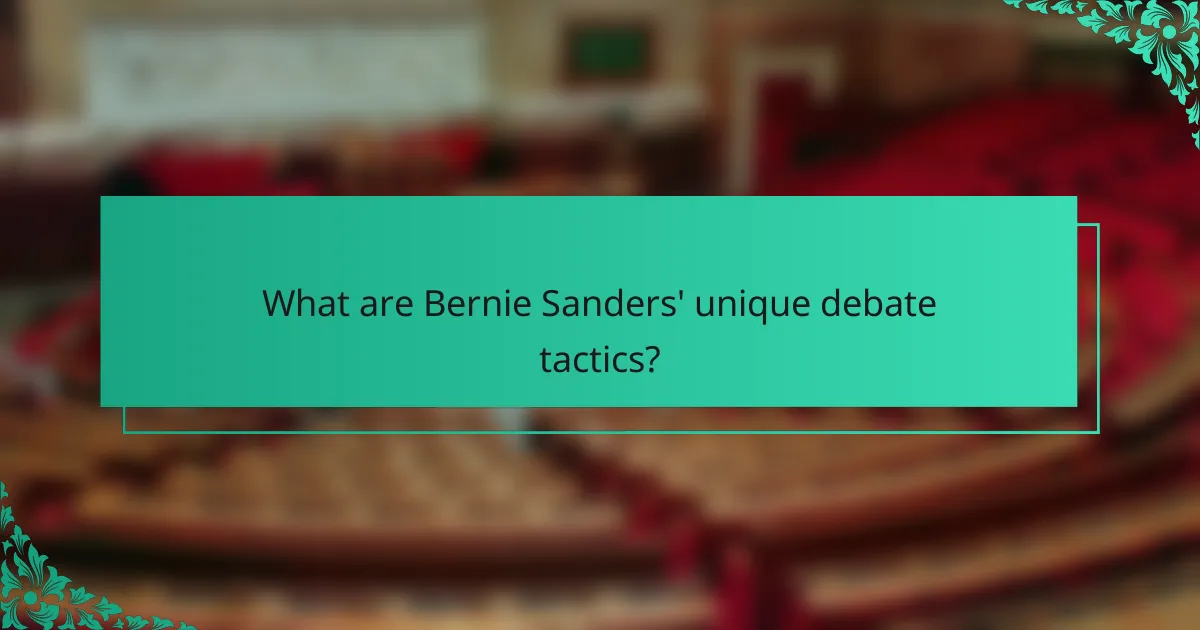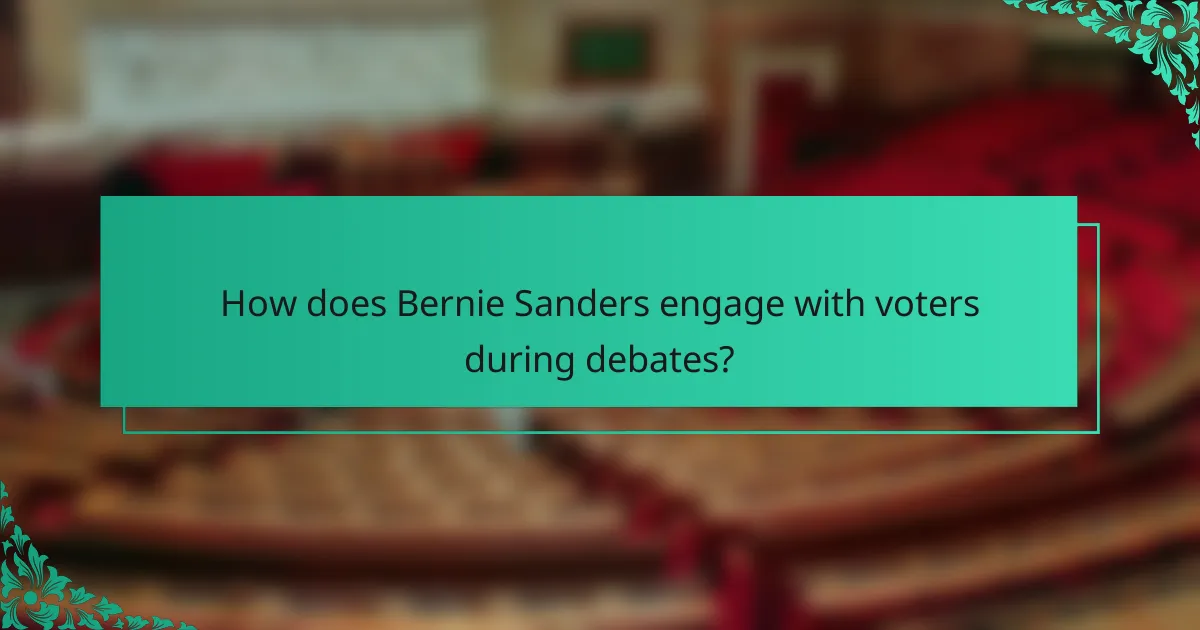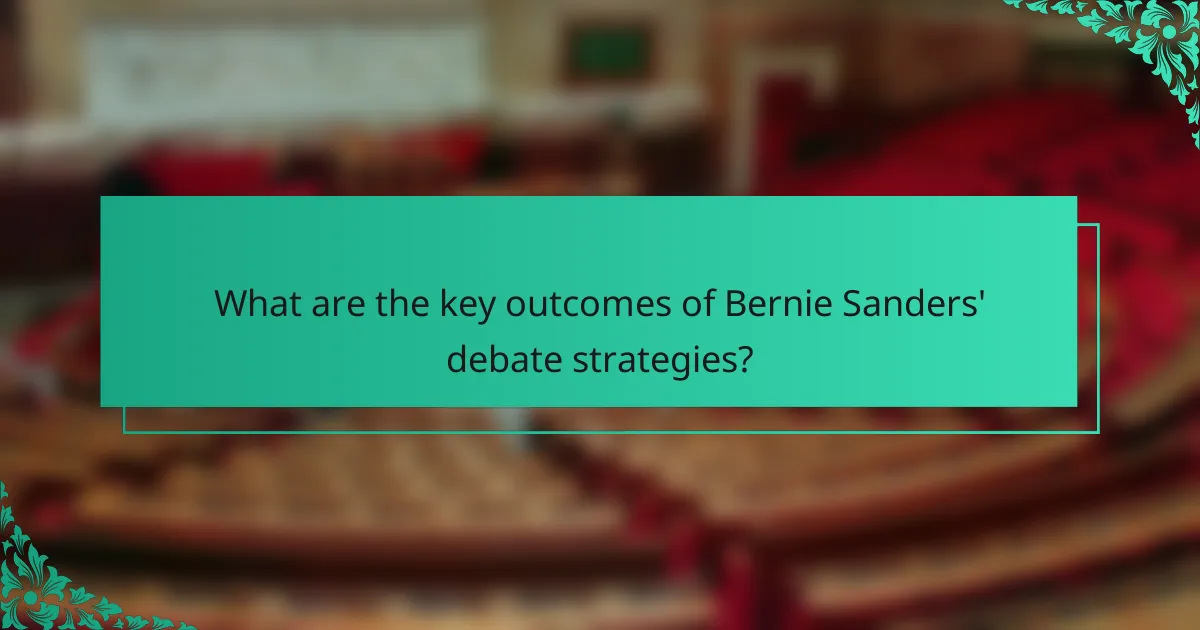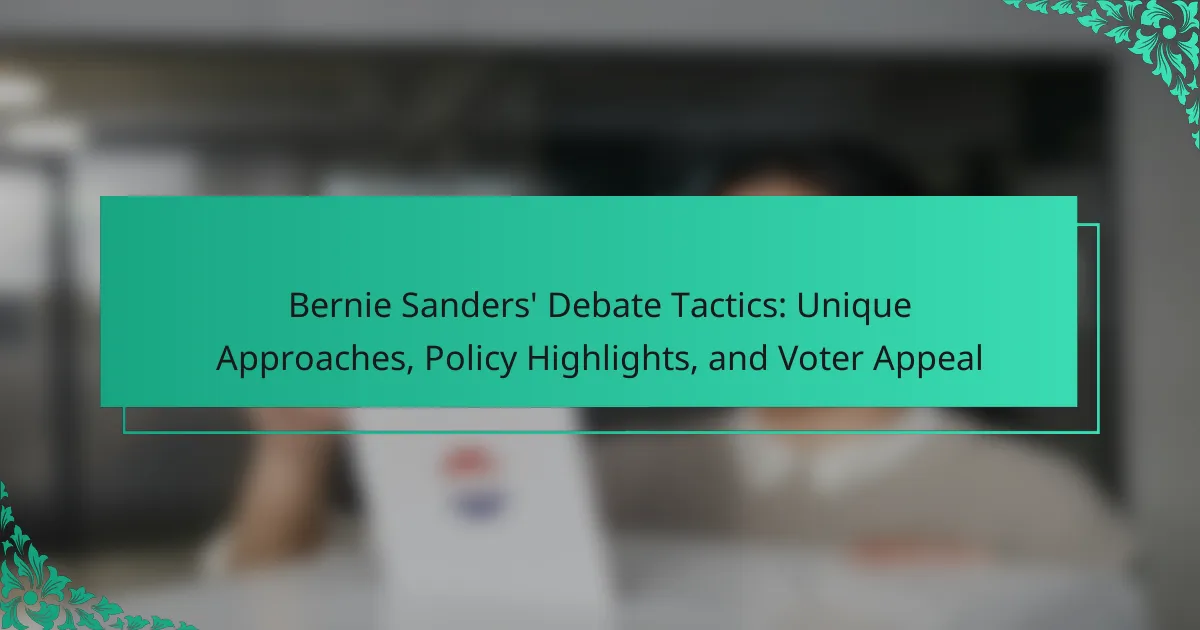Bernie Sanders is a prominent political figure known for his distinctive debate tactics that focus on economic inequality and social justice. His strategies include using personal anecdotes to emotionally connect with voters, emphasizing a clear contrast between his policies and those of his opponents, and adopting a direct, confrontational style to challenge the status quo. Sanders addresses key issues such as healthcare, income inequality, and climate change, fostering audience engagement and participation. His approach has effectively increased visibility and support for his progressive policies, as evidenced by rising favorability ratings following debates. Overall, Sanders’ tactics underscore his commitment to progressive values and resonate strongly with his voter base.

What are Bernie Sanders’ unique debate tactics?
Bernie Sanders’ unique debate tactics include a focus on economic inequality and social justice. He often uses personal anecdotes to connect with voters emotionally. Sanders emphasizes a clear contrast between his policies and those of his opponents. He frequently employs a direct and confrontational style to challenge the status quo. His use of facts and statistics aims to back his claims and reinforce credibility. Additionally, Sanders often highlights grassroots support to demonstrate widespread backing for his policies. These tactics have proven effective in engaging audiences and rallying support during debates.
How do his tactics differ from those of other politicians?
Bernie Sanders’ tactics differ from those of other politicians by emphasizing grassroots mobilization and direct engagement with voters. He often relies on town hall meetings and social media to connect personally with constituents. Sanders focuses on economic inequality and universal healthcare, which are central themes in his campaigns. Unlike many politicians, he avoids corporate donations, which he argues leads to a more authentic connection with voters. His use of bold, clear messaging contrasts with the more nuanced approaches often taken by others. Sanders also prioritizes policy discussions over personal attacks during debates, fostering a more issue-centric dialogue. This strategy appeals to a broad base seeking transparency and integrity in politics.
What specific strategies does he employ during debates?
Bernie Sanders employs several specific strategies during debates. He often uses personal anecdotes to connect with the audience emotionally. This approach helps humanize his policy positions. Sanders also emphasizes key policy issues like healthcare and income inequality. He frequently cites statistics to back his claims, enhancing credibility. Additionally, he maintains a consistent message throughout his campaigns. This reinforces his brand as a progressive candidate. Sanders often challenges opponents directly to highlight differences in policy. This tactic engages viewers and clarifies his stance. His strategies aim to resonate with voters seeking authentic representation.
How does his communication style influence his debate performance?
Bernie Sanders’ communication style significantly influences his debate performance. His direct and passionate delivery resonates with audiences. This approach fosters a sense of authenticity and urgency. Sanders often uses personal anecdotes to connect with voters emotionally. This technique enhances relatability and strengthens his arguments. Research shows that emotional appeals can increase persuasion in political contexts. His use of clear, concise language aids in audience understanding. This clarity helps him effectively convey complex policy ideas. Overall, his communication style is integral to his debate success.
What role does policy play in Bernie Sanders’ debate tactics?
Policy is central to Bernie Sanders’ debate tactics. He consistently emphasizes progressive policies to distinguish himself from opponents. Sanders uses policy proposals to connect with voters’ needs and concerns. His focus on issues like healthcare and income inequality resonates with many. This approach builds his identity as a champion of the working class. By articulating clear policy positions, he enhances his credibility. His debates often feature detailed plans, showcasing his expertise. This strategy effectively mobilizes support and engages audiences.
Which key policies does he highlight during debates?
Bernie Sanders highlights several key policies during debates. He emphasizes Medicare for All as a fundamental healthcare reform. Sanders advocates for a Green New Deal to address climate change. He also focuses on wealth inequality and proposes a wealth tax on the ultra-rich. Education reform, including tuition-free public college, is another significant policy he promotes. Additionally, Sanders discusses the importance of raising the minimum wage to $15 an hour. These policies resonate with his progressive base and aim to address systemic issues in American society.
How does he frame his policies to appeal to voters?
He frames his policies by emphasizing social justice and economic equality. Sanders articulates issues like wealth disparity and healthcare access clearly. He connects these issues to the everyday experiences of voters. By using relatable anecdotes, he builds emotional resonance. Sanders often highlights the struggles of the working class. He contrasts his vision with the status quo, appealing to a desire for change. His focus on grassroots movements showcases a collective effort for progress. This approach resonates with voters seeking authentic representation.

How does Bernie Sanders engage with voters during debates?
Bernie Sanders engages with voters during debates by emphasizing relatable issues. He often discusses healthcare, income inequality, and climate change. Sanders uses personal anecdotes to connect with the audience. He directly addresses voter concerns and questions. His passionate delivery enhances his appeal. Sanders frequently contrasts his views with opponents to clarify differences. He also encourages audience participation and feedback. This approach fosters a sense of community and shared purpose.
What techniques does he use to connect with his audience?
Bernie Sanders uses several techniques to connect with his audience. He employs personal storytelling to create relatable narratives. This approach helps humanize his policies and makes them more accessible. Sanders also utilizes a direct and passionate speaking style. This style resonates with listeners and conveys authenticity. He frequently addresses economic inequality, a topic that deeply affects many Americans. By focusing on shared struggles, he fosters a sense of community. Additionally, Sanders often engages with audience questions during events. This interaction promotes a two-way dialogue and enhances connection. His use of clear, straightforward language further aids understanding. Overall, these techniques effectively bridge the gap between him and his audience.
How does he address voter concerns in his debate responses?
He addresses voter concerns by directly acknowledging their issues during debates. Sanders often uses personal anecdotes to connect with voters. He emphasizes the importance of healthcare, income inequality, and climate change. His responses include specific policy proposals aimed at these concerns. For example, he advocates for Medicare for All to address healthcare accessibility. He also highlights wealth redistribution as a solution to income inequality. By focusing on these topics, he demonstrates understanding and empathy. This approach resonates with many voters looking for genuine representation.
What is the impact of his personal storytelling on voter appeal?
Personal storytelling significantly enhances Bernie Sanders’ voter appeal. It creates a connection between him and the electorate. By sharing personal experiences, he humanizes his political message. This approach fosters relatability and trust among voters. Research indicates that voters are more likely to engage with candidates who share authentic narratives. A study by the Harvard Kennedy School found that personal stories can increase voter empathy and support. Sanders’ storytelling often highlights themes of struggle and resilience. This resonates deeply with voters facing economic challenges. Overall, his personal storytelling serves as a powerful tool in building voter loyalty and engagement.
How does Sanders’ debate performance affect his overall campaign?
Sanders’ debate performance significantly influences his overall campaign. Effective debate tactics can enhance his visibility and voter appeal. Strong performances often lead to increased donations and support. Polling data shows that candidates who perform well in debates tend to see a boost in their standings. For example, after a successful debate, Sanders experienced a rise in national polls. This rise can translate into greater media coverage and public interest. Conversely, poor debate performances may hinder his momentum and support. Overall, debates play a crucial role in shaping public perception and campaign viability.
What metrics are used to evaluate his debate success?
Metrics used to evaluate Bernie Sanders’ debate success include audience engagement, fact-check accuracy, and polling results. Audience engagement can be measured through social media interactions and live audience reactions. Fact-check accuracy assesses the truthfulness of statements made during debates. Polling results gauge voter sentiment before and after debates, reflecting shifts in public opinion. These metrics collectively provide insight into his effectiveness in debates.
How do debates influence voter perception and support?
Debates influence voter perception and support by shaping public opinion and highlighting candidate differences. They provide a platform for candidates to communicate their policies directly to voters. During debates, candidates can clarify their positions and respond to opponents’ criticisms. This interaction can sway undecided voters by presenting compelling arguments. For example, a study by the Pew Research Center found that 63% of debate watchers reported changing their perception of a candidate after a debate. Effective debate performances can enhance a candidate’s credibility and relatability. Conversely, poor performances may lead to decreased support. Overall, debates serve as critical moments in the electoral process, impacting voter decisions significantly.

What are the key outcomes of Bernie Sanders’ debate strategies?
Bernie Sanders’ debate strategies have led to increased visibility and support for his policies. His clear focus on income inequality resonated with many voters. Sanders effectively used personal anecdotes to connect with the audience. His confrontational style often challenged opponents, showcasing his commitment to progressive values. This approach energized his base and attracted new supporters. Polls following debates indicated a boost in his favorability ratings. Additionally, his consistent messaging on healthcare reform and wealth redistribution solidified his position as a leading progressive candidate. Overall, Sanders’ debate strategies successfully emphasized his core values and policy priorities.
How do his debate tactics contribute to his political identity?
Bernie Sanders’ debate tactics significantly shape his political identity. He employs direct communication to resonate with voters. His use of personal anecdotes highlights his working-class background. This approach fosters relatability and trust among constituents. Sanders often emphasizes progressive policies, reinforcing his identity as a champion for social justice. He challenges opponents aggressively, showcasing his commitment to standing up for his beliefs. This confrontational style distinguishes him from more traditional politicians. His focus on issues like healthcare and income inequality aligns with his identity as a democratic socialist. Overall, Sanders’ debate tactics effectively communicate his values and political stance.
What lasting impressions do his debates leave on the electorate?
Bernie Sanders’ debates leave a lasting impression of authenticity and passion on the electorate. Voters often perceive him as genuine due to his consistent messaging on economic inequality. His focus on universal healthcare and tuition-free college resonates with many, especially younger voters. Sanders’ ability to articulate complex policies in relatable terms enhances his appeal. The emotional connection he establishes during debates often translates into increased voter enthusiasm. Polls have shown a significant uptick in support for him following debate performances. His confrontational style against establishment politics reinforces his image as a champion for the common person. Overall, his debates foster a strong sense of trust and commitment among his supporters.
What best practices can be learned from Bernie Sanders’ debate tactics?
Bernie Sanders’ debate tactics emphasize authenticity, clarity, and direct engagement with issues. He consistently presents his policies in straightforward terms. This approach enhances audience understanding and retention. Sanders also uses personal anecdotes to connect emotionally with viewers. This strategy builds rapport and trust. Additionally, he often challenges opponents directly, reinforcing his stance. This assertiveness can energize supporters and attract undecided voters. Overall, these tactics demonstrate the importance of being genuine and relatable in political discourse.
How can aspiring politicians implement similar strategies effectively?
Aspiring politicians can implement similar strategies effectively by focusing on authenticity and clear messaging. They should prioritize presenting their core values and policies in a straightforward manner. Engaging with voters through town halls and social media builds trust and visibility. Using personal stories can create emotional connections with constituents. Research shows that candidates who share relatable experiences often resonate more with voters. Additionally, addressing current issues directly can enhance relevance and appeal. Candidates should also emphasize grassroots support to demonstrate widespread backing. This approach has been successful for many politicians, including Bernie Sanders, who utilized these tactics to connect with a diverse electorate.
The main entity of the article is Bernie Sanders and his debate tactics. The article provides a detailed overview of Sanders’ unique approaches, which include a focus on economic inequality, social justice, and personal storytelling to engage voters. It highlights key policies he emphasizes during debates, such as healthcare reform and wealth redistribution, and examines how his direct communication style influences voter perception and support. Additionally, the article discusses the impact of his debate performance on his overall campaign and outlines best practices that aspiring politicians can learn from his strategies.
